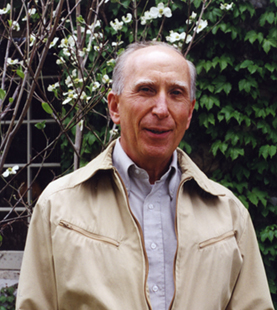Remembrance of Ed Misch by Alison Bechdel ’77

I was eleven the first time I met Ed, when he and Mary got married. At that age I didn’t really think much about what Ed’s job was. The only things I knew about him back then were that he was pleasantly mild-mannered, like Clark Kent. And that he would eat his breakfast cereal not from a cereal bowl, but from a full-sized mixing bowl, into which he would pour about half the box. The first time my brothers and I saw him do this, we were astonished. But I admired this trait. It was curiously at odds with Ed’s otherwise unassuming nature. And there was something very forthright and refreshing about it. If that’s how much cereal you wanted, why mess around with a teeny tiny bowl?
Eventually I learned that Ed was a college professor at a small experimental school called Simon’s Rock, and at seventeen I came to Simon’s Rock as a student.
I didn’t expect to have Ed as a teacher, because he taught history and philosophy, and I was planning to study art and literature. But in my freshman year, I became friends with a girl who was taking Introduction to Western Philosophy with Ed, and she was constantly going on about how amazing this class was, and all the great stuff she was learning in it. I came to understand that Ed had a small but very select cult following. I think he would have been completely shocked had he known this, but that was part of his appeal.
Of course I signed up for Intro to Western Philosophy in my sophomore year. I wanted to get in on this action.
I loved having Ed as a teacher. He was not one of those pyrotechnical professors who teach by sheer force of personality. He was quite self-effacing, and got out of the way in order to put us in direct contact with the mind-blowing questions we were exploring, like, is what we think of as reality really real? And, how do we know what we know? And what is knowledge, anyway? Ed was a true scholar, like an actual medieval scholastic, who taught us how to reason our way methodically through these dense ideas. He guided and clarified, he taught us the joys of precise language. But he knew that ultimately we had to grasp the concepts ourselves, and he gave us the tools we needed to do that.
We spent the entire first half of the fall semester on Plato, and he assigned a paper on Plato’s Theory of Forms. You know, the idea that there’s a realm of abstract, perfect concepts that transcend time and space, and the everyday world we live in is just a pale shadow of that ultimate reality.
Looking back, I think the thing about Ed was, he actually dwelled in that other realm. He had one foot in this world, but mostly, he lived in that world of abstract, perfect concepts. I even think now of his giant cereal bowl as the true cereal bowl, of which all our everyday cereal bowls are sad, imperfect little copies.
When certain people die, usually people who die very young, we make sense of it to ourselves by saying they were “too good for this world.” But I think this was actually true of Ed. We were lucky to have him among us for a while, but I like to think that he’s returned to his true domain, the world of pure ideas.